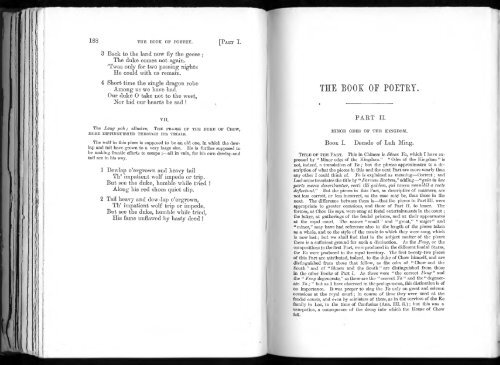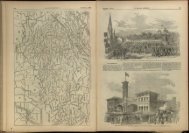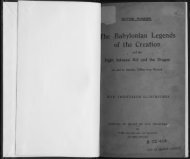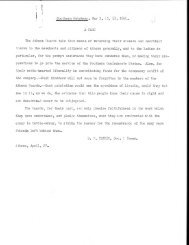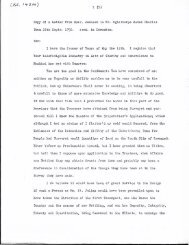THE SHE KING; OR, THE BOOK OF ANCIENT POETRY
THE SHE KING; OR, THE BOOK OF ANCIENT POETRY
THE SHE KING; OR, THE BOOK OF ANCIENT POETRY
Create successful ePaper yourself
Turn your PDF publications into a flip-book with our unique Google optimized e-Paper software.
,<br />
188 TUB <strong>BOOK</strong> OP POETET. [PAET I.<br />
3 Back to the land now fly the geese;<br />
The duke comes not again.<br />
'Twas only for two passing nights<br />
He could with us remain.<br />
4 Short time the single dragon robe<br />
Among us we have had.<br />
Our duke 0 take not to the west,<br />
Nor bid our hearts be sad !<br />
VII.<br />
The Lang poh; allusive. <strong>THE</strong> PRAISE <strong>OF</strong> <strong>THE</strong> DUKE <strong>OF</strong> CHOW,<br />
M<strong>OR</strong>E DISTINGUI<strong>SHE</strong>D THROUGH HIS TRIALS.<br />
The wolf in this piece is supposed to be an old one, in which the dew<br />
lap and tail have grown to a very large size. He is further supposed to<br />
be making frantic efforts to escape ;—all in vain, for his own dewlap and<br />
tail are in his way.<br />
1 Dewlap o'ergrown and heavy tail<br />
Th* impatient wolf impede or trip.<br />
But see the duke, humble while tried !<br />
Along his red shoes quiet slip.<br />
2 Tail heavy and dew-lap o'ergrown,<br />
Th' impatient wolf trip or impede.<br />
But see the duke, humble while tried,<br />
His fame unflawed by hasty deed !<br />
<strong>THE</strong> <strong>BOOK</strong> <strong>OF</strong> POETEY.<br />
PART II.<br />
MINOE ODES <strong>OF</strong> <strong>THE</strong> <strong>KING</strong>DOM.<br />
<strong>BOOK</strong> I. Decade of Luh Ming.<br />
TITLE <strong>OF</strong> <strong>THE</strong> PART. This in Chinese is Seaou Ya, which I have ex<br />
pressed by " Minor odes of the Kingdom." " Odes of the Kingdom " is<br />
not, indeed, a translation of Ya; but the phrase approximates to a de<br />
scription of what the pieces in this and the next Part are more nearly than<br />
any other I could think of. Ya is explained as meaning—Correct; and<br />
Lacharme translates the title by " Parmtm Rectum" adding—"guiain hac<br />
parte meres describuntur, recti illi qiAHem, gni tamen nonnlMl a recto<br />
deflectunt." But the pieces in this Part, as descriptive of manners, are<br />
not less correct, or less incorrect, as the case may be, than those in the<br />
next. The difference between them is—that the pieces in Part III. were<br />
appropriate to greater occasions, and those of Part II. to lesser. The<br />
former, as Choo He says, were sung at festal entertainments in the court;<br />
the latter, at gatherings of the feudal princes, and at their appearances<br />
at the royal court. The names "small" and "great," "major" and<br />
"minor," may have had reference also to the length of the pieces taken<br />
as a whole, and to the style of the music to which they were sung, which<br />
is now lost; but we shall find that in the subject matter of tlie pieces<br />
there is a sufficient ground for such a distinction. As the Fling, or the<br />
compositions in the first Part, were produced in the different feudal States,<br />
the Ya were produced in the royal territory. The first twenty-two pieces<br />
of this Part are attributed, indeed, to the duke of Chow himself, and are<br />
distinguished from those that follow, as the odes of " Chow and the<br />
South " and of " Shaou and the South " are distinguished from those<br />
in the other Books of Part I. As there were " the correct Fang " and<br />
the " Fung degenerate," so there are the " correct Ya " and the " degener<br />
ate Ya; " but as I have observed in the prolegomena, this distinction is of<br />
no importance. It was proper to sing the Ya only on great and solemn<br />
occasions at the royal court; in course of time they were used at the<br />
feudal courts, and even by ministers of these, as in the services of the Ke<br />
family in Loo, in the time of Confucius (Ana. III. ii.) ; but this was a<br />
usurpation, a consequence of the decay into which the House of Chow<br />
fell.


